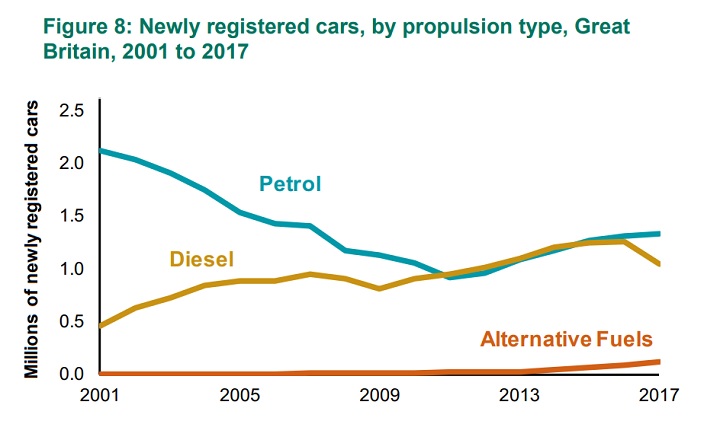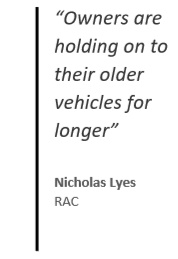
A sharp decline in the number of diesel cars registered for the first time in 2017 is the reason behind the first fall in the overall new vehicle market since 2011.
Figures published by the DfT on 12 April show that 3,102,887 new vehicles were registered in 2017 – 6% (193,070) fewer than the 3,295,957 registered in 2016.
The number of diesel cars registered fell by 214,721 (17%) – from 1,262,167 in 2016 to 1,047,446 in 2017.
The DfT says this ‘dramatic’ change could be attributed to the increase to Vehicle Excise Duty (VED) rates in April 2017; as well as plans unveiled in July 2017 to end the sale of all new conventional petrol and diesel cars and vans by 2040.
 The RAC says doubts over the future of diesel cars and the rise in VED are causing ‘confusion’ among buyers.
The RAC says doubts over the future of diesel cars and the rise in VED are causing ‘confusion’ among buyers.
Nicholas Lyes, RAC roads policy spokesman, said: “These statistics appear to confirm an uncomfortable truth – that new car registrations are falling because there is increasing confusion over what vehicles drivers should opt for next.
“The risk is that owners are holding on to their older vehicles for longer. This is bad news as far as efforts to improve local air quality is concerned as like-for-like newer models have lower emissions.”
Despite the overall decline, the number of ultra low emission vehicles (ULEVs) registered for the first time rose by 27% to 53,000.
ULEVs accounted for 1.7% of all new vehicle registrations – up from 1.2% in 2016 and 0.9% two years before.
Reporting an article of interest on air quality on a road safety website hardly qualifies that as acknowledgement that it is a road safety item. When the powers that be across the UK expressly ring fence road safety funding for air quality issues, then it could become a road safety item.
At the moment Air quality is in there somewhere as it forms part of ‘wellbeing’ and ‘health’ but the funding bodies would need to consider, promote and rank air quality more prominently over normal road casualty reduction for changes to happen.
Pat, Wales
+3
Diesel NOx and PM10 emissions are about 10 times higher than petrol cars, although CO2 emissions are of the same order.
I presume that it is the public health implications of NOx and PM10 diesel car emissions which makes this a road safety item. Its good to see this being acknowledged.
Rod King, Warrington
--3
Why the confusion? New car owners pay a first car tax payment which is modest for all fuel alternatives with CO2 emissions under 130g/km. Diesels then pay a rapidly increasing first car tax payment as emissions go higher unless they have NOx emissions to RDE2. In which case they just get clobbered to the same extent as petrol fuelled vehicles.
You can avoid this problem completely by not buying a brand new car and you can avoid it in future by ensuring the new price of your used vehicle was under £40,000 if registered on or after 1 April 2017.
For the rest of us with older cars, no real change.
Pat, Wales
+9